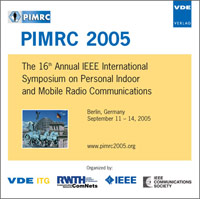Effective Capacity of Advanced Wireless Cellular Networks
Konferenz: PIMRC 2005 - 16th Annual IEEE International Symposium on Personal Indoor and Mobile Radio Communications
11.09.2005 - 14.09.2005 in Berlin, Germany
Tagungsband: PIMRC 2005
Seiten: 10Sprache: EnglischTyp: PDF
Persönliche VDE-Mitglieder erhalten auf diesen Artikel 10% Rabatt
Autoren:
Glisic, S.; Nikolic, Z.; Milosevic, N.; Pirinnen, P. (University of Oulu, Telecommunication Laboratory, PO Box 4500, 90401 Oulu, Finland)
Inhalt:
In this paper we analyze capacity losses in advanced Code Division Multiple Access (CDMA) network due to imperfections in the operation of the system components. In addition to the standard WCDMA technology both, base stations and mobile units use antenna beam forming and self steering to track the incoming (and transmitted) signal direction. By using high directivity antennas and antenna pointer tracking the level of multiple access interference (MAI) and the required transmitted power are reduced. In order to exploit the available propagation diversity signals arriving from different directions (azimuth ?? , elevation ?? ) and delay ?? , are combined in 3D (?? ,?? ,?? ) RAKE receiver. This is expected to significantly improve the system performance. The main result of this work is a systematic mathematical framework for capacity evaluation of such CDMA network in the presence of implementation imperfections and fading channel. The theory is general and some examples of practical set of channel and system parameters are used as illustration. As an example, it was shown that in the case of voice applications and 2D (4 antennas?? 4 multipaths) RAKE receive, up to 90% of the system capacity can be lost due to the system imperfections. Further elaboration of these results, including extensive numerical analysis based on the offered analytical framework, would provide enough background for understanding of possible evolution of advanced W-CDMA and MC CDMA towards the fourth generation of mobile cellular communication networks


